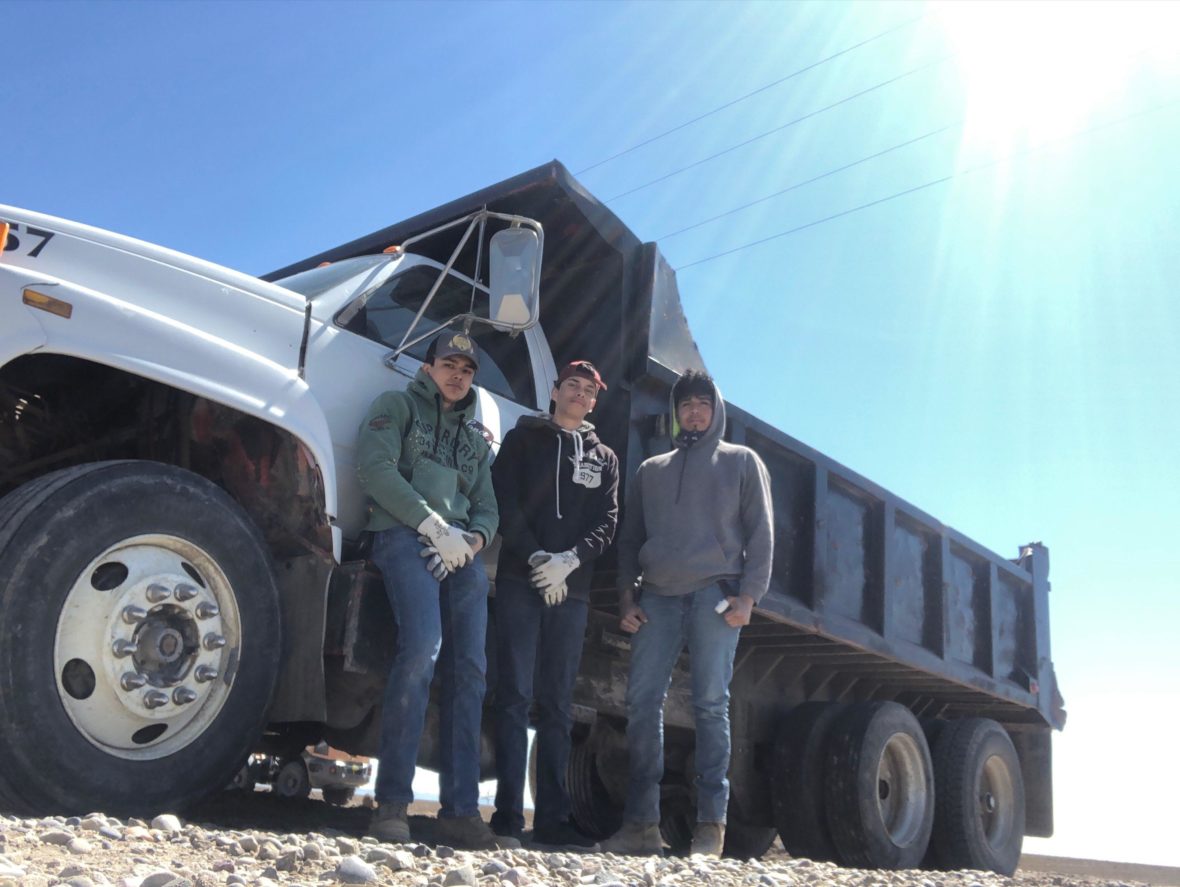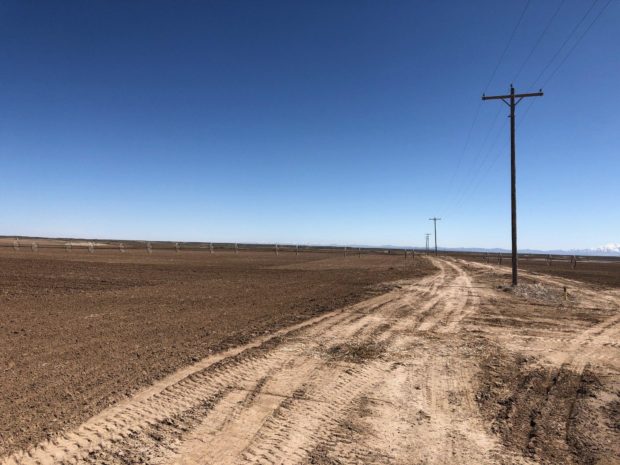
While many of their classmates are doing school work at home, three teens walk miles across desolate brown fields in East Idaho, picking up rocks.
The American Falls High School students spend six days a week scouring the dirt, hauling out stones up to 100 pounds so farmers can plant seeds.
Rafael Villa, 17, plays rap and reggaeton on his portable speaker as they go. It was his idea that the boys take on the agriculture job while their schools are closed due to the novel coronavirus. He’d worked picking rock the summer before.
“Rafael called me and said: ‘Do you want to pick up some rocks?’’” said Edgar Soltero, 17. “Of course I said yes, because I’ve got nothing else to do.”
With Idaho students completing coursework remotely for the foreseeable future, more are filling their days with farm labor and agricultural work. Teens say this is a good way to make money for themselves, or their families, while their schoolwork is flexible and farmers need their help. But educators and farmworker advocates worry it could take a toll on students’ education — or worse, their health.
“This is definitely a concern,” said Sarah Seamount, the migrant education coordinator for the Idaho State Department of Education. “Although these students are not at school, they are still in school and are expected to continue their education during this soft closure, just like all Idaho public school students.”
Educators say students are moving into farmwork earlier than usual
At the same time the coronavirus has freed students from rigid class schedules, farmers still need workers for various agricultural jobs, which can pose particular risks for children.
The majority of child work-related fatalities occur in agricultural jobs, according to a 2018 U.S. Government Accountability Office report. Kids can encounter pesticide exposure, dangerous equipment or extreme temperatures on the job.
Idaho’s agricultural industry is ramping up for the year. But many farmers’ usual workforce of Mexican nationals on H-2A temporary agricultural visas is unable to enter the country because of coronavirus-related visa delays. And the early stages of field preparation and planting can be some of the most labor intensive.

It’s not uncommon for students to use their summer vacations or after-school hours to work in agriculture, especially in rural parts of eastern and southern Idaho. Often, these students are Latino, have a family connection to agriculture, or are migrant students whose families move for agriculture work.
But educators across the state say they’re seeing students take these jobs earlier — while the school year is still technically under way.
Harold Nevill, administrator for the Canyon-Owyhee School Service Agency (COSSA), estimates that 30 to 50 percent of his students are working. Some are mechanics or working in healthcare. But most of his students are in the fields.
“These are not insignificant numbers,” Nevill said. “And we are not alone.”
While the American Falls high schoolers pick rocks, Nevill’s students are preparing hop fields. Migrant education coordinators report that students across the state are sorting onions, cutting potato seed or at home taking care of siblings while their parents work these essential jobs.
Zoom calls from the fields
Senior Edwin Hernandez brings his Chromebook out to the rocky fields. He does homework or calls into virtual classroom meetings during his hour-long lunch break.
When his government class discussed historical racism in jury selection on a recent call, small video tiles gave a glimpse into the learning environments of his classmates. Most were in their living rooms or bedrooms.
Hernandez called in from the cab of a work truck parked in the middle of farmland.
“It makes me smile when kids are literally on their lunch break, making an effort to join the conversation,” government teacher Caroline Wight said.
Most of Wight’s students are working or taking care of siblings during the school closures, and a few have taken on new jobs since the school closures began. The majority of those students are balancing their class load, even if they’ve ramped up hours at work, Wight said. Others are struggling.
“You just don’t know if you can push and ask ‘should you really be working?’ or not. It’s a family, a student’s choice,” Wight said. “With some kids, I know that this is really necessary for their family.”
Seamount is concerned that if students are working during the day, they’re not doing schoolwork when teachers are around to help. Nevill, at COSSA, said teachers have started teaching classes in the evenings. Wight is fielding texts from students late into the night.
The American Falls teens have mixed experiences with their new class schedules. Villa says he doesn’t have too much homework, and rarely has to stay up late to get it done. Soltero tries to save his for the weekends. Hernandez often works into the night, occasionally turning assignments in late when he runs out of time.
Distance learning is a challenge for the senior.
“I feel like I’m not learning anything,” Hernandez said. “It’s way different having a teacher in front of you than having meetings online, and learning by yourself.”
Still he doesn’t plan to give up his day job. Hernandez is enrolling at Idaho State University next fall and will use the $10.50 an hour he makes picking rock to help pay for college expenses.
“Work can get in my way, but also I need the money,” he said. “I’ll put extra effort in my school and work, and I can handle it.”
Feds falter on issuing new Covid-19 guidance for young workers
Educators report that high school students have taken on agriculture jobs during the coronavirus pandemic, but officials worry kids as young as 12 or 13 may start joining their families in the fields as childcare gets scarce and economic hardship increases.
Estimates from child advocacy groups and the Child Agricultural Injury Survey say about 500,000 kids under the age of 18 are working in U.S. agriculture jobs.
Irma Morin, the CEO of the Community Council of Idaho, said she’s worried that migrant parents will struggle to find childcare if Migrant and Seasonal Head Start centers remain closed. Liaisons in the state migrant education program say some students are going to work in agriculture with their parents because nobody can stay home with them.
“In some cases, the parent has no choice since lack of child care is a problem,” Seamount said.
The U.S. Department of Labor has few agricultural labor restrictions for students older than 16 such as Soltero, Hernandez and Villa — regardless of whether or not school is in session. Fourteen- and 15-year-olds can only work in agriculture outside of school hours and in non-hazardous jobs, while 12- and 13-year-olds also need a parent present or written permission.
But the “soft closure” of Idaho schools has left unanswered when schools are technically in session or not.
Federal labor officials have yet to provide enforcement guidance with all the changes from the pandemic, said Dunnia Aplicano, the state farmworker advocate for the Idaho Department of Labor. A spokesman for the U.S. Department of Labor regional office based in San Francisco was also unable to provide reporters the new definition of “school hours” by the time of publication.
Seamount and Aplicano have reached out to agricultural employers and trade associations to remind employers the importance of teens continuing their education, and that safety is paramount.
“I know that the rules allow for the kids to work in the fields, but the safety of these kids is the number one priority,” Aplicano said. “I don’t care how old these kids are — safeguard the health and safety of these kids.”
The American Falls students estimate they have another month of picking rocks ahead of them, if the weather cooperates. If school still hasn’t resumed, they might move onto other work.
Soltero said that if he can’t keep up with his schoolwork, he’ll quit working. His parents are supportive of his job right now, he said, and would be supportive if he decided to quit. If he wasn’t working he’d probably spend his days playing video games.
“I don’t really like being home. I like being out in the sun,” he said. “…I like accomplishing something.”
